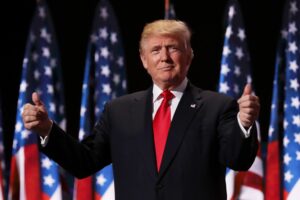By this time, the American people should have realized that they elected a moron to head the federal government, a description by Rex Tillerson that fit Donald Trump, also known as Krasnov at the Kremlin, and his flip-flopping on tariff increases is proof positive that he is the most atrocious example of Dunning-Kruger effect running roughshod and unchecked by the few adults in the Republican party.
Trump, being the transactional conman that he is, has been using the tariff crisis as a means to line his pockets, with estimates of his supposed wealth, including the dollars he amassed from the Russian mafia in Florida, sinking to $4.2 billion from $4.5-billion. With his deliberate fudging of tariff rates against 220 countries, he pushed the stock market to drown, only for his to reverse course in a matter of hours, but not after his plutocrat cronies had amassed shares at lower costs, only to dump them as prices rose.
Thus, there is logic to his madness, and the Democrats and the entire world are furious. They want Trump investigated for insider trading. This is a case of real, brutish and irresponsible insider trading as Trump had manipulated the markets for weeks, raising tariffs, then pausing them, then raising them again. At the outset, Trump, who hardly reads and understands, promoted the ignorant twaddle that tariffs are being paid for by exporting corporations or their governments. Yet, the supposedly adults in the room like Scott Bessent, the highest-ranking gay in Trump’s government, and Howard Lutnick swallowed the guff, forgetting to remind Trump that high economics teaches that tariffs are a tax on imports that are passed on to consumers.
Trump then segues into the myth that $2-billion in tariffs are collected by the US daily, a lie as big as his enormous but worthless ego. Surely, he didn’t lean that from her mother, Mary McLeod who used to work as a maid, or from Fred Trump of the Ku Klux Klan. With Bessent and Lutnick acting as Trump’s acolytes, it is remote that they, too, profited from the tariff scam that rattled the bourse. A snake oil salesman, Trump sometimes dabbles with the lesson propounded by Niccolò Machiavelli in 1517, who said it is “a very wise thing to simulate madness.” Then, 445 years later, Herman Kahn argued that by looking mad, a leader can force his adversary to stand down.
Treasury expert Brent Neiman, cited by Donald Trump in defense of his tariffs, has a message for the president: “He got it wrong.” Brent Neiman, a Biden-appointed Treasury official, was one of four economists whose work on trade was held up by the president to justify the tariffs, said Trump did not understand their work, but his tariffs caused a $7-trillion loss at the bourse, Adam Nichols reported for Raw Story on April 7, 2025. “It got personal,” Neiman argued. “The Office of the US Trade Representative (USTR) released its methodology and cited an academic paper produced by four economists, including me, seemingly in support of their numbers. But they got it wrong. Very wrong. I disagree fundamentally with the government’s trade policy and approach.” He said Trump should stop gaslighting people and scrap the mindless tariff plan that will scourge Americans.
Neiman said his research suggested any tariffs should be much smaller than the figures Trump came up with — a quarter of the size. He then went on to describe a fundamental lack of understanding from Trump in the economics that he’s dealing with. Firstly, he’s wrong in his claim that his tariffs would eliminate trade deficits with trading partners. “Trade imbalances between two countries can emerge for many reasons that have nothing to do with protectionism,” he wrote. “Americans spend more on clothing made in Sri Lanka than Sri Lankans spend on American pharmaceuticals and gas turbines. So what? That pattern reflects differences in natural resources, comparative advantage and development levels. The deficit numbers don’t suggest, let alone prove, unfair competition.”
“For the sake of argument, let’s grant President Trump his goal of eliminating all trade deficits, no matter how destructive that would be. Could these reciprocal tariffs succeed? Again, no. The administration’s tariff formula assumes that a tariff placed on one country won’t affect imports from any others and ignores any implications for exports. These assumptions may work for an action against one small trade partner, but not for the broad salvo announced last week. A large tariff on Japanese auto parts could cause an increase in demand for imports from Mexico and vice versa. And the tariffs clearly invite retaliation and may over time increase the dollar’s value, both factors that would most likely depress US exports,” Neiman continued.
He smacked down the formula that Trump used to divine the tariffs. “Alberto Cavallo, Gita Gopinath, Jenny Tang and I studied the tariffs placed on Chinese exports in 2018 and 2019. (This is the “Cavallo et al.” reference in the government’s methodology.) We found that tariffs of, say, 20% caused domestic importers to pay nearly 19% more. This represents a pass-through into import prices of about 95%, which is the value I would have plugged into the government’s tariff formula. In simple terms, that implies that the price paid for US imports would rise almost as much as the tariff rate. The administration’s trade office cites our work, but mentions a different result from the paper, which found a low pass-through rate to the listed prices at two retailers. The Trump administration then plugs a rate of 25% into its formula. Where does 25% come from? Is it related to our work? I don’t know.” He concluded: “I would strongly prefer that the policy and methodology be scrapped entirely.” (DIEGO MORRA)




